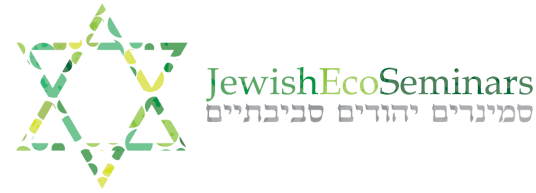Jewish Ecology at Camps
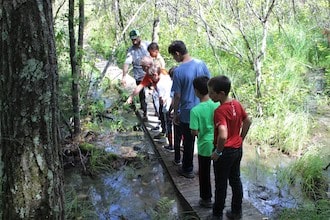
Jewish Eco Seminars (JES) offers unique, interactive programming on Jewish ecology at summer camps. Based on support from the Foundation for Jewish Camp and Avi Chai Innovation Fund, JES’ founding director Rabbi Yonatan Neril provided 40 sessions of programming to bunks during the summers of 2018 and 2019. These programs reached over 400 campers and staff at the following overnight camps in North America:
-
- Camp Zeke in Pennsylvania
- Camp Interlaken JCC in Wisconsin
- URJ Camp George in Ontario
- Camp Moshava Indian Orchard in Pennsylvania
- URJ Camp Newman in California
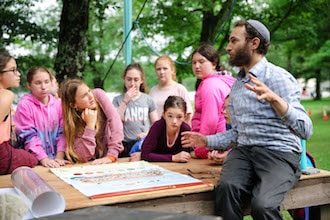
He also served as a visiting Jewish ecology educator at Camp Tawonga, and engaged campers from Camp Wise and JCCA camps trips visiting Israel.
Click here to read his thoughts on ‘Wildfires and Jewish Summer Camps.’
The activities and games that Jewish Eco Seminars leads are adapted from Sharing Nature. One example is the ‘Meet a Tree’ activity.
All activities include Torah and Israel-related content to promote greater appreciation for God’s creation, and living within it, in balance.
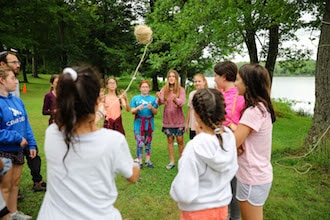
Jewish Eco Seminars (JES) engages campers and staff with innovative Jewish experiential nature games! JES founder and director Rabbi Yonatan Neril offers sessions of hour-long programs for individual bunks.
We will go out into the beautiful nature at camp and explore about animals, water, trees, and biodiversity, and also see some cool Jewish ecological infographics. Through the power of outdoor, active games, campers will be exposed to the dynamic connection between Judaism, Israel, ecology, and sustainable living. These games are based on an outdoor learning method called ‘Sharing Nature,’ which we have adapted to relate to Jewish values and Israel. 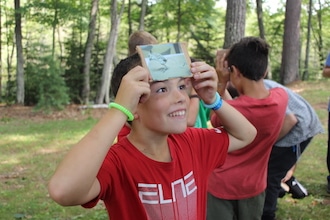
The one-hour program also involves learning from six large Jewish ecological infographic posters, developed by JES. 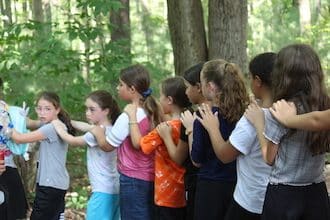
Our goal is to help campers and staff emerge with an enhanced awareness of the relevance of Jewish wisdom to ecological sustainability. 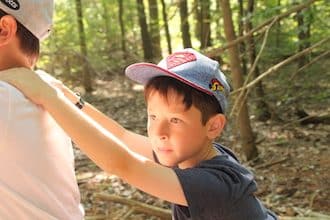
Camp is the ideal setting for exploring Jewish-ecological concepts in relation to biodiversity, animal welfare, food and trees. It’s valuable and impactful to take campers on nature walks through the unique ecosystems that exist on camp property, allowing them to appreciate their surroundings in a new – and Jewishly-inspired – way.
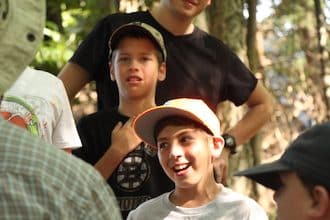
At Camp Zeke in Pennsylvania, for example, the programming took place next to a lake and involved creating a string web representing interdependence. Campers were guided with eyes closed as a group, walking around nature like a caterpillar. At Camp Interlaken in Wisconsin, we explored the boardwalk within a peat bog, one of the most biodiverse ecosystems in North America and the world’s most effective carbon sink. And at Camp Newman on the San Francisco Bay, which last year lost its home to wildfires, we learnt how Jewish teachings relate to sustainability. As record wildfires burned two counties north of camp, we discussed how a Jewishly-inspired practice of stewardship would curb global warming. It is a privilege to help campers understand how ecology is a meaningful expression of Jewish values, and we welcome the opportunity of 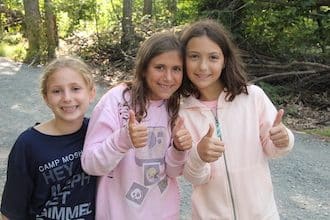
JES Past Camp Programming, Reference, and Details
During the summer of 2018, Rabbi Yonatan Neril engaged with 200 campers and staff at three camps during 23 sessions at Camp Zeke in Pennsylvania, Camp Interlaken JCC in Wisconsin, and URJ Camp Newman in California. A blog post about those sessions was posted on the FJC blog here. He also served as a visiting Jewish ecology educator at Camp Tawonga in California during a previous summer, where he was also previously a camper and counselor.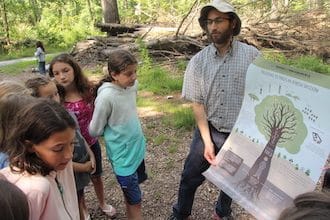
Lori Ginsberg, Teen Director at Camp Zeke, is happy to serve as a camp reference for Rabbi Neril. She wrote, “I was delighted to see the teens engage in a thoughtful and meaningful discussion, particularly outside of a classroom setting. Your presentation was thought-provoking and timely, giving our next generation of Jewish leaders information that will inspire them to help protect our precious earth.” Please contact us if you seek a reference.
Please contact us at info@jewishecoseminars.com for more information about bringing JES Jewish eco programming to your camp!
